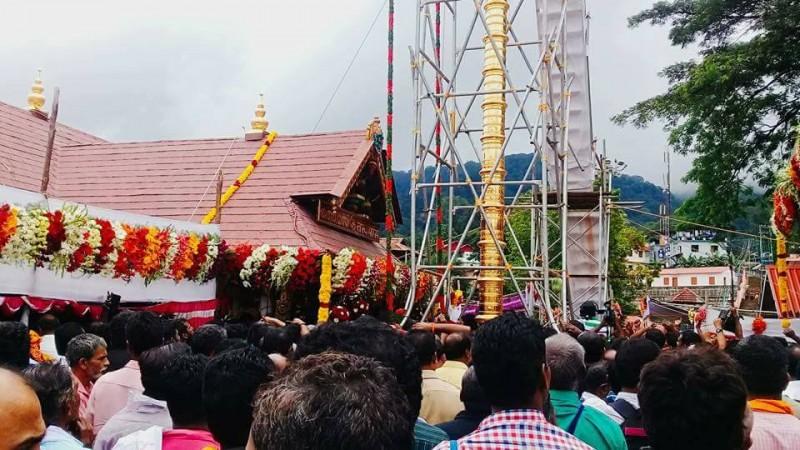Over two decades before the Supreme Court allowed entry of women of all ages into the Lord Ayyappa temple at Sabarimala, a woman IAS officer had visited the hill shrine as part of her official duty, armed with a special order from the high court.
Braving threats from conservatives and the tough terrains of the hillock, KB Valsala Kumari, then collector of Pathanamthitta district, visited the temple complex at least four times during 1994-95, aged 41.
Though women in the 10-50 age group were barred from entering the hill shrine then, the Kerala High Court allowed Kumari to visit the shrine to coordinate the activities of various agencies as part of the preparations of the annual pilgrim season.
The court, however, had observed that her visit would not be connected with the pilgrimage and it would be strictly part of her official duties as the district collector.
The woman officer was also asked not to climb the 'Pathinettam Padi', the sacred 18 gold-plated steps, leading to the sanctum sanctorum. "I could visit Sabarimala at that age, thanks to the high court order. Now, the apex court has thrown open the doors to women of all age groups. The verdict is really good," she said.
An ardent devotee of Lord Ayyppa, Kumari was the first woman to visit the Sabarimala shrine with legal backing. The officer had ignored threat letters against visiting the shrine. Kumari, who has retired from the service now, said she climbed the sacred steps and offered worship to Lord Ayyappa only after she turned 50.
"I had no permission to go and see the Lord Ayyappa idol when I reached Sabarimala with the court order. But, I prayed with folded hands and meditated for a while standing below the holy steps," she told PTI.
The former bureaucrat welcomed the recent Supreme Court order opening the portals of Sabarimala to women of all ages, and said anyone whose mind and body was pure can visit the shrine.
Recalling her visit to the temple, she said in 1994 the high court had sought details of the preparatory works being carried out at the shrine by the government departments as part of the next pilgrimage season.
Kumari said she was told by her higher-ups that she could not go to the temple as there was a court order preventing the entry of women aged between 10-50 years.
"So, I informed the high court that I really wanted to visit the temple and collect details. But I am unable to go (because of the bar)," Kumari said.

Based on a request by her, the court granted her special permission to visit the temple and inspect the arrangements. An excited Kumari said she still has vivid memories of the hour-long trekking to the abode of Lord Ayyappa.
"It was really thrilling to experience the places and sights that we had heard a lot from others," she said.
The journey also had given the officer an opportunity to have first-hand knowledge about sanitation issues and a grave garbage problem at Sabarimala and the temple premises.
"Heaps of garbage could be seen even near the temple. Decayed flower garlands, pooja articles and clothes being dumped for years could also be seen there," Kumari, who was later entrusted with the massive sanitation drive at the shrine by the government, recollected.
Realising the fragile ecosystem of Sabarimala hills, the officer had introduced nature-friendly toilets in the region. Instead of concrete structures, trenches with reusable aluminum covers were brought in as make-shift toilets, she said, adding no tree was cut.
She also took the initiative to clean Pamba river at the foothills and make available safe drinking water in Sabarimala.
The woman officer also conceptualised and set up the Sabarimala Sanitation Society (SSS), an exclusive cleaning machinery for the hillock shrine.
"I myself took part in various drives carried out by the SSS volunteers in cleaning the river and removing the left over clothes by devotees," she said.

Kumari said she could perform her duties in a better way only because she got a chance to visit Sabarimala and experience the ground reality there.
The former IAS officer, who garnered accolades for various initiatives as the head of all-women network Kudumbashree, said the infrastructure and the facilities at Sabarimala should be made "women-friendly" in the wake of the apex court order.
"We can ensure women devotees a smooth darshan through better planning. Special queue system can be put in place for them. Certain days or weeks can be reserved only for women to offer worship," she suggested.
The Supreme Court had on September 28 lifted the ban on the entry of women aged between 10-50 years to the hill shrine, holding that the centuries-old Hindu religious practice was illegal and unconstitutional.

















